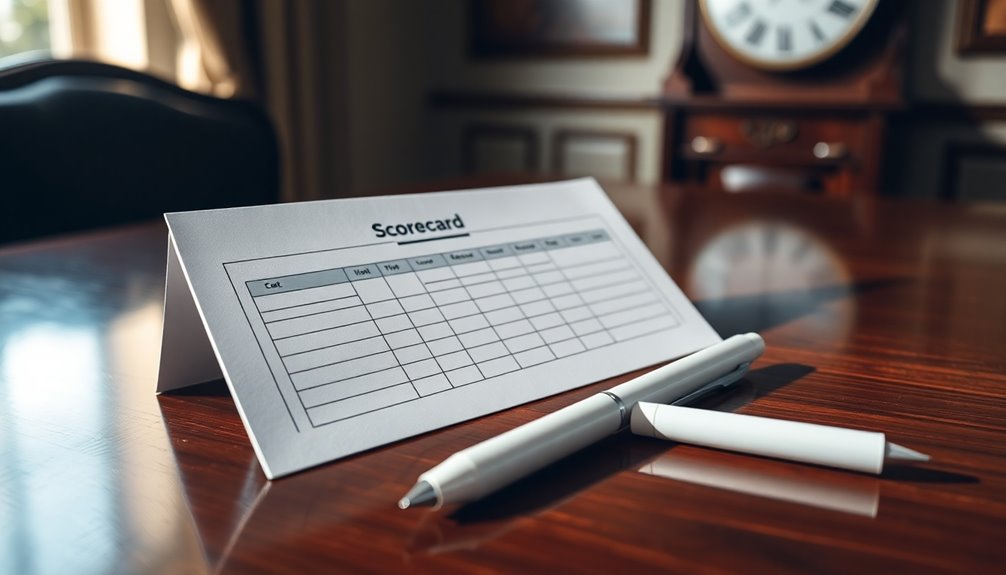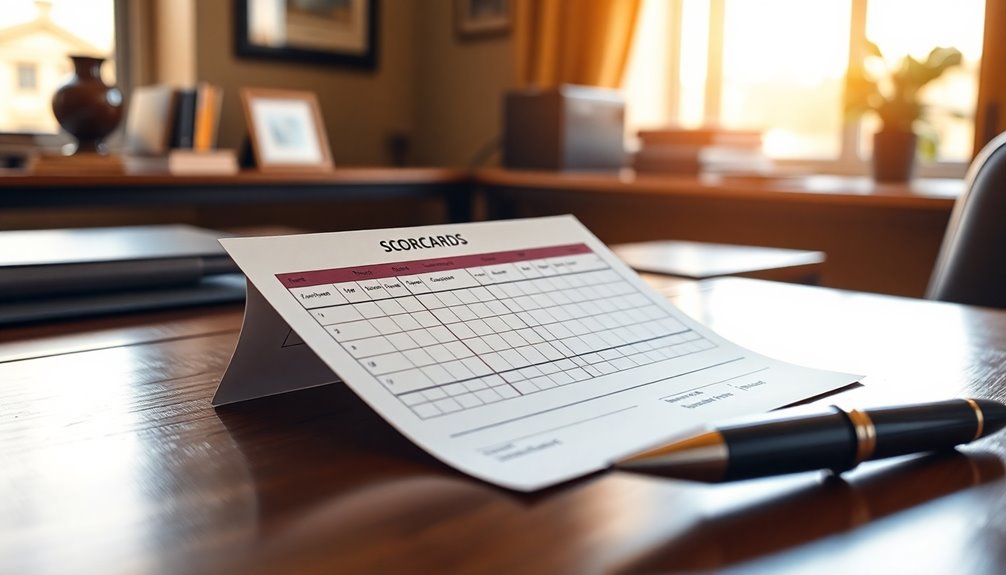Your second interview scorecard's key for determining if you're about to receive an offer. By evaluating your performance against predefined criteria, you can see how well you align with the job requirements and company culture. A strong score means you've demonstrated the necessary skills, while areas for improvement might indicate you need to address certain concerns. Keep in mind that the clarity and fairness of the scorecard can also impact how the hiring team views you. Want to understand how to maximize your scorecard results? There's more insightful information ahead to help you succeed.
Key Takeaways
- Your performance on the second interview scorecard assesses your fit for the role and alignment with company culture.
- Look for positive feedback from interviewers, which may indicate you are a strong candidate for the offer.
- A standardized scorecard that highlights your competencies can enhance your chances of receiving an offer.
- Questions about your long-term goals and cultural alignment suggest the interviewers are seriously considering you for the position.
- Transparency in the evaluation process indicates the company values fairness, which is a positive sign for potential offers.
Importance of Interview Scorecards

The importance of interview scorecards can't be overstated in today's competitive hiring landscape. They guarantee objectivity in your recruitment process by minimizing personal biases and subjective judgments, leading to fair evaluations. By evaluating candidates based on predefined competencies and skills, you reduce the risk of discriminatory decisions, promoting Diversity, Equity, Inclusion, and Belonging (DEIB) at work.
Scorecards also standardize the interview process, guaranteeing that every candidate is evaluated using the same criteria. This uniform scoring system allows you to easily compare candidates and guarantees consistency across different interviewers. By focusing on the same job criteria and qualifications, you create a more organized and efficient interview experience. Furthermore, standardized criteria ensure that all interviewers are aligned on what constitutes a successful candidate.
Moreover, interview scorecards facilitate data-driven decision-making. They provide a structured way to collect and analyze candidate data, enabling you to identify qualified candidates more quickly. This approach supports informed decisions during hiring and allows for the aggregation of evaluation data to select the best fit for your team.
Finally, scorecards serve as formal documentation, enhancing transparency and compliance while making your hiring decisions more legally defensible. Emphasizing the importance of scorecards can transform your hiring practices for the better.
Preparing Your Scorecard

Preparing your scorecard sets the stage for a successful second interview. You'll want to gather your thoughts and strategies ahead of time, ensuring you're ready to shine. Here's how to get started:
- Analyze Your Previous Interview: Reflect on what went well and where you can improve. Identify any unanswered questions that you can address this time around.
- Develop Responses to Common Questions: Prepare answers for job-specific challenges and your employment preferences. Focus on how your strengths align with the company culture.
- Research the Company and Role: Dig deeper into the company's recent developments and its needs. Speak with insiders or alumni for valuable insights. Understanding company culture can help you tailor your responses effectively.
As you prepare your scorecard, keep your resume fresh in your mind, highlighting your key achievements and their relevance to the new role. Anticipate the types of questions you may face, especially from senior-level leaders, and prepare thoughtful queries for them, too. By being organized and proactive, you'll feel more confident and ready to impress in your second interview.
Benefits of Scorecards

Utilizing scorecards in the interview process brings a host of benefits that can considerably enhance your hiring strategy. First, scorecards guarantee objectivity and fairness by eliminating personal biases and guaranteeing consistent evaluation across interviewers. This promotes a fair hiring process, using the same criteria for all candidates.
Second, they standardize the interview process, allowing interviewers to focus on the qualities deemed desirable for the position. This structured approach helps you stay organized and guarantees no important qualifications are forgotten. Additionally, establishing a scoring system ensures that every candidate is assessed based on clearly defined performance levels.
Lastly, scorecards enhance evaluation and comparison by enabling you to objectively evaluate candidates' strengths and weaknesses. They facilitate informed discussions among the hiring team, which leads to better decision-making.
Here's a quick overview of the benefits:
| Benefit | Description |
|---|---|
| Objectivity & Fairness | Eliminates biases and promotes consistent evaluations |
| Standardization | Guarantees a uniform process for all candidates |
| Enhanced Evaluation | Provides a framework for evaluating strengths/weaknesses |
Incorporating scorecards into your interviews streamlines your decision-making process, saving time and improving your overall hiring strategy.
Role in Second Interviews

Second interviews play an essential role in evaluating a candidate's fit for both the position and the company culture. During this stage, the hiring team digs deeper into your qualifications and compatibility. Here's what to expect:
- In-Depth Questions: You'll face more job-specific and detailed questions aimed at gauging your alignment with both the role and the company culture.
- Meeting Key Stakeholders: You may interact with senior executives and potential team members, giving everyone a chance to assess your fit within the organization.
- Discussion of Past Experiences: Be prepared to share specific examples from your work history that demonstrate your capabilities and approach to challenges.
The second interview also focuses on your long-term career goals and how they align with the company's vision. It's vital to show you've done your homework and are genuinely interested in the opportunity. Remember, this isn't just about them evaluating you; it's also your chance to determine if this is the right workplace for you. Make sure to ask insightful questions and get a feel for the company culture while you're there. Additionally, the use of an interview scoring sheet can help interviewers objectively assess your responses and overall fit during the evaluation process.
Impact on Candidate Evaluation

During your second interview, how you're evaluated can greatly influence your chances of landing the job. A standardized assessment helps guarantee that every evaluator has a clear understanding of scoring, reducing ambiguity and minimizing bias. This consistency allows for objective comparisons among candidates. Additionally, using interview scorecards ensures that evaluations are based on predefined standards, further enhancing the fairness of the process.
Here's how the evaluation process typically breaks down:
| Evaluation Aspect | Description |
|---|---|
| Standardized Assessment | Predefined criteria for consistent scoring |
| Thorough Evaluation | Looks at behavior, skills, and cultural fit |
| Qualitative Data | Space for notes to provide context for scores |
| Final Decision-Making | Clear scoring system for informed hiring choices |
Your responses to interview questions and your overall demeanor matter. Evaluators consider your communication skills, professionalism, and alignment with company values. They'll supplement numerical ratings with detailed insights, making the evaluation both qualitative and quantitative. This structured approach not only helps them arrive at a clear final score but also guarantees that the decision-making process is transparent. Ultimately, understanding how you're assessed can empower you to present your best self during the interview.
Best Practices for Scorecards

A well-designed scorecard can greatly enhance the candidate evaluation process, guaranteeing that each interview is both effective and fair. To achieve this, consider these best practices:
- Define Specific Criteria: Break down generic skills into specific ones like "active listening" or "client presentation ability."
- Use a Standardized Template: Create a scorecard template for each job role to maintain consistency across evaluations.
- Implement a Standardized Rating Scale: Utilize a clear rating system with defined anchors to guarantee everyone interprets scores uniformly.
When crafting your scorecard, tailor it to align with the job description and highlight key competencies essential for success. Make certain to include space for contextual notes, allowing evaluators to provide insight into their ratings. Additionally, standardized assessments can help reduce bias and support data-driven decision-making in recruitment.
Train interviewers on using the scorecard effectively, focusing on real-time ratings during interviews to minimize bias. Finally, always explain the scorecard process to candidates at the outset. This not only fosters transparency but also enhances their overall experience. By following these best practices, you'll guarantee a more streamlined and unbiased candidate evaluation process.
Frequently Asked Questions
How Do I Prepare for My Second Interview?
To prepare for your second interview, start by reviewing your first performance and identifying areas for improvement. Research the interviewers and the company thoroughly. Practice your responses to common questions, including behavioral ones, and develop fresh examples of your skills. Dress slightly more formally than the company's usual attire, arrive well-rested, and plan to engage positively with the interviewers. Finally, prepare thoughtful questions to demonstrate your genuine interest in the role.
What Should I Wear to a Second Interview?
Imagine stepping into the room, looking polished and confident. For your second interview, consider the company's vibe. If it's corporate, a classic suit in navy or gray works best. For business casual, opt for a sleek dress and a blazer. In a startup, dark jeans and a smart shirt keep it relaxed yet professional. Always do your homework on their culture, and dress one notch above to show you mean business.
How Long Should a Second Interview Last?
A second interview typically lasts between 45 and 90 minutes, but it can go longer. You're diving deeper into discussions, so expect more in-depth questions about your fit for the role and company culture. Sometimes, you'll meet various team members, which might extend the time. If there are additional components like workplace tours or meals, factor those into the overall duration, as they can also add to the experience.
Can I Ask About Salary in the Second Interview?
When it comes to discussing salary in your second interview, you've got to tread lightly. If the topic hasn't come up naturally, it's best to wait. Show your enthusiasm for the role first and express the value you bring. If the employer mentions salary, you're in a better position to negotiate. Remember, keep the conversation open about benefits and flexibility, and save the hard negotiations for the offer stage.
What Types of Questions Are Common in Second Interviews?
In second interviews, you'll often face behavioral and situational questions that dig deeper into your experiences. Expect inquiries about conflicts with colleagues or challenges you've tackled. Cultural fit questions will assess how well you mesh with the team, while career-oriented queries will explore your goals and contributions. You might also discuss your skills and work ethic, helping the interviewer gauge your potential impact on the company. Be prepared to share specific examples!
Conclusion
To sum up, using an interview scorecard can really help you get your ducks in a row for that second interview. By systematically evaluating candidates, you can make a more informed decision and guarantee you're not just going with your gut. Remember, a well-prepared scorecard not only highlights strengths and weaknesses but also streamlines your selection process. So, take the time to create one—it might just be your ticket to landing the right candidate!









